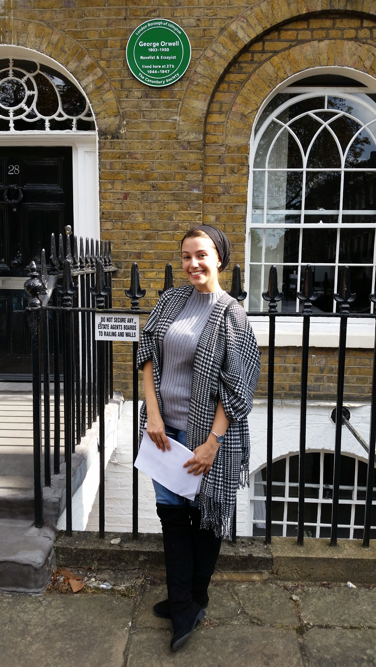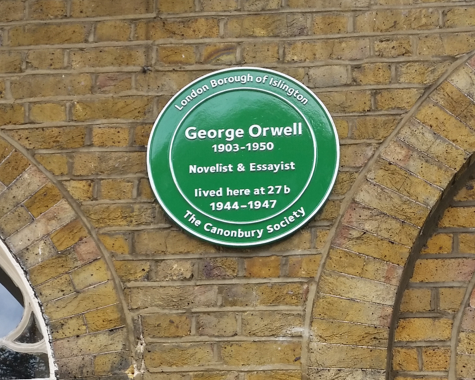Is “Big Brother” Becoming a Reality?
Amaney Ehtash is one of 21 LLB1 students who won the chance to see her induction work published on Lawbore (she also got an Amazon voucher, just in case this privilege wasn’t enough!). This was part of the #exploringthelaw project – students tracked down 4 buildings of legal significance on a trail around London, researched the locations and then penned a blog post on something they were inspired by.
 Upon reading the plaque outside 27b Canonbury Square, you may dismiss George Orwell a simply being a “novelist and essayist”. After a few pictures outside the house of one of the writers I admire most, the first thing that came into my head was indeed Orwell’s well-known novel, 1984.
Upon reading the plaque outside 27b Canonbury Square, you may dismiss George Orwell a simply being a “novelist and essayist”. After a few pictures outside the house of one of the writers I admire most, the first thing that came into my head was indeed Orwell’s well-known novel, 1984.
Without revealing too much about the novel, 1984 is a novel that warns of the dangers of a totalitarian state – the society depicted would not be dissimilar to that witnessed in Nazi Germany or the Soviet Union. The Party within this novel, also known as “Big Brother”[1], has complete control over its people. From the way people greet each other, to the foods they eat, and even as far as monitoring every action of its people, day and night.
What is most shocking about this novel, for me, is the use of language. The Party’s aim is to completely abolish language as we know it by taking away, shortening and simplifying words that are considered to provoke thought. This would mean pretty much every aspect of language is altered. 1984 highlights how the manipulation of language can be used as a psychological mechanism of control. If language can be controlled, then language of revolt will not exist. If the language of revolt does not exist, ideas of revolution would subsequently not exist. Before you know it, those in positions of power have covertly abolished the possibility of revolution through mind control.
So how does this relate to law? Simply, Orwell’s novel can be seen as a vehicle that advocates thought. It urges you to question everything until you can question no more. Therefore, it comes as no surprise that in 2014, an Egyptian student was arrested for carrying a copy of 1984. A novel that encourages the next generation to question decisions made by their government was probably not the most ideal book for an Egyptian teen to be in possession of in the eyes of the regime. Given that Egypt at the time saw a year of anti-government protests resulting in many students being arrested[2], this novel can be seen as a potential threat to current positions of authority.
 But surely we must be allowed to exercise free thought? Whilst those in power may not be able to see our thoughts, it seems as though elements of the dystopian image Orwell paints may be a reality in some parts of the world. Of course, with any fictional novel, the circumstances may be slightly exaggerated and therefore have limited place in the real-world, but nonetheless, Orwell’s writing encourage us to ask “what if?”
But surely we must be allowed to exercise free thought? Whilst those in power may not be able to see our thoughts, it seems as though elements of the dystopian image Orwell paints may be a reality in some parts of the world. Of course, with any fictional novel, the circumstances may be slightly exaggerated and therefore have limited place in the real-world, but nonetheless, Orwell’s writing encourage us to ask “what if?”
What if we did not have the language we have to communicate our thoughts? What if we did not have the necessary bridge of communications to those in power of law-making? The “bridge” that I am referring to would be you and me, and anyone willing to invest the time into gaining knowledge of the law so that we can question everything around us.
Those that stay in touch with the law and its recent developments will question what, how and most importantly, why. A society that encourages you to think is a society that will not be subject to the possibility of covert control by its leaders.
[1] http://www.telegraph.co.uk/books/what-to-read/the-genius-of-george-orwell/
[2] https://www.theguardian.com/world/2014/nov/10/egyptian-student-arrested-1984-orwell
